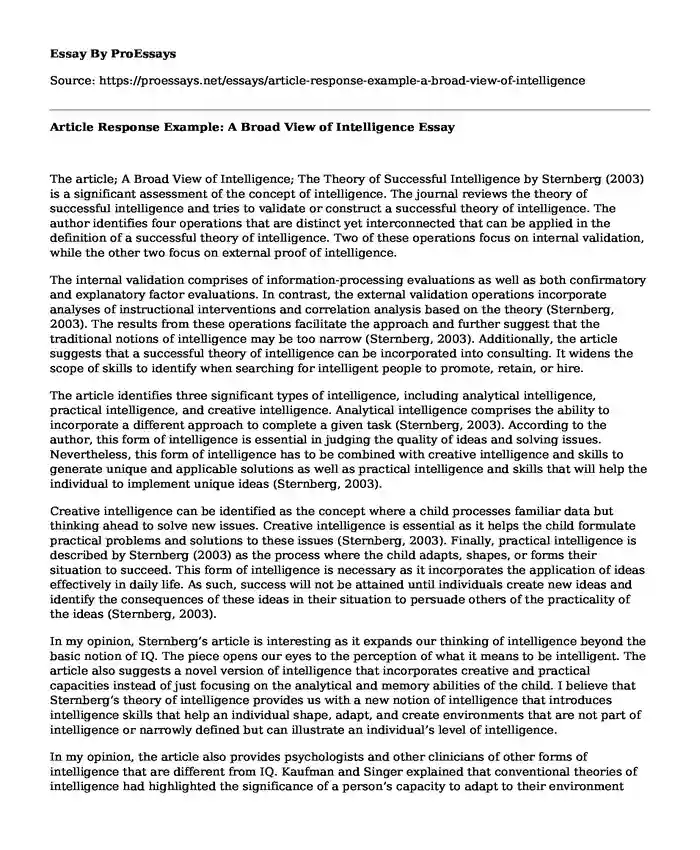The article; A Broad View of Intelligence; The Theory of Successful Intelligence by Sternberg (2003) is a significant assessment of the concept of intelligence. The journal reviews the theory of successful intelligence and tries to validate or construct a successful theory of intelligence. The author identifies four operations that are distinct yet interconnected that can be applied in the definition of a successful theory of intelligence. Two of these operations focus on internal validation, while the other two focus on external proof of intelligence.
The internal validation comprises of information-processing evaluations as well as both confirmatory and explanatory factor evaluations. In contrast, the external validation operations incorporate analyses of instructional interventions and correlation analysis based on the theory (Sternberg, 2003). The results from these operations facilitate the approach and further suggest that the traditional notions of intelligence may be too narrow (Sternberg, 2003). Additionally, the article suggests that a successful theory of intelligence can be incorporated into consulting. It widens the scope of skills to identify when searching for intelligent people to promote, retain, or hire.
The article identifies three significant types of intelligence, including analytical intelligence, practical intelligence, and creative intelligence. Analytical intelligence comprises the ability to incorporate a different approach to complete a given task (Sternberg, 2003). According to the author, this form of intelligence is essential in judging the quality of ideas and solving issues. Nevertheless, this form of intelligence has to be combined with creative intelligence and skills to generate unique and applicable solutions as well as practical intelligence and skills that will help the individual to implement unique ideas (Sternberg, 2003).
Creative intelligence can be identified as the concept where a child processes familiar data but thinking ahead to solve new issues. Creative intelligence is essential as it helps the child formulate practical problems and solutions to these issues (Sternberg, 2003). Finally, practical intelligence is described by Sternberg (2003) as the process where the child adapts, shapes, or forms their situation to succeed. This form of intelligence is necessary as it incorporates the application of ideas effectively in daily life. As such, success will not be attained until individuals create new ideas and identify the consequences of these ideas in their situation to persuade others of the practicality of the ideas (Sternberg, 2003).
In my opinion, Sternberg’s article is interesting as it expands our thinking of intelligence beyond the basic notion of IQ. The piece opens our eyes to the perception of what it means to be intelligent. The article also suggests a novel version of intelligence that incorporates creative and practical capacities instead of just focusing on the analytical and memory abilities of the child. I believe that Sternberg’s theory of intelligence provides us with a new notion of intelligence that introduces intelligence skills that help an individual shape, adapt, and create environments that are not part of intelligence or narrowly defined but can illustrate an individual’s level of intelligence.
In my opinion, the article also provides psychologists and other clinicians of other forms of intelligence that are different from IQ. Kaufman and Singer explained that conventional theories of intelligence had highlighted the significance of a person’s capacity to adapt to their environment where the person has little or no control. However, Sternberg’s theory provides an opportunity for the individual to create and adjust to a new environment. As such, the article should be incorporated to create awareness on the broad theory of human intelligence, which does not only focus on the memory or analytical abilities of an individual.
References
Kaufman, S. B., & Singer, J. L. (2004). Applying the theory of successful intelligence to psychotherapy training and practice. Imagination, Cognition, and Personality, 23(4), 325-355. https://doi.org/10.2190/tjej-k6ge-auav-eeyc
Sternberg, R. J. (2003). A broad view of intelligence: The theory of successful intelligence. Consulting Psychology Journal: Practice and Research, 55(3), 139-154. https://doi.org/10.1037/1061-4087.55.3.139
Cite this page
Article Response Example: A Broad View of Intelligence. (2023, Dec 17). Retrieved from https://proessays.net/essays/article-response-example-a-broad-view-of-intelligence
If you are the original author of this essay and no longer wish to have it published on the ProEssays website, please click below to request its removal:
- Research Paper on Post-Traumatic Stress Disorder on Rape Victims
- Literacy Program Evaluation Paper Example
- Essay Sample on Overcoming Fear of Public Speaking: A Study of Predispositions
- Essay Example on Psychopaths: Impact on Criminal Justice Systems
- Maternal Depression: Low Self-Esteem, Fatigue & More - Essay Sample
- Sleep Difficulties in Children With Autism: Causes and Solutions - Essay Sample
- Essay Example on College Degree: A Key To Earning A Higher Income







